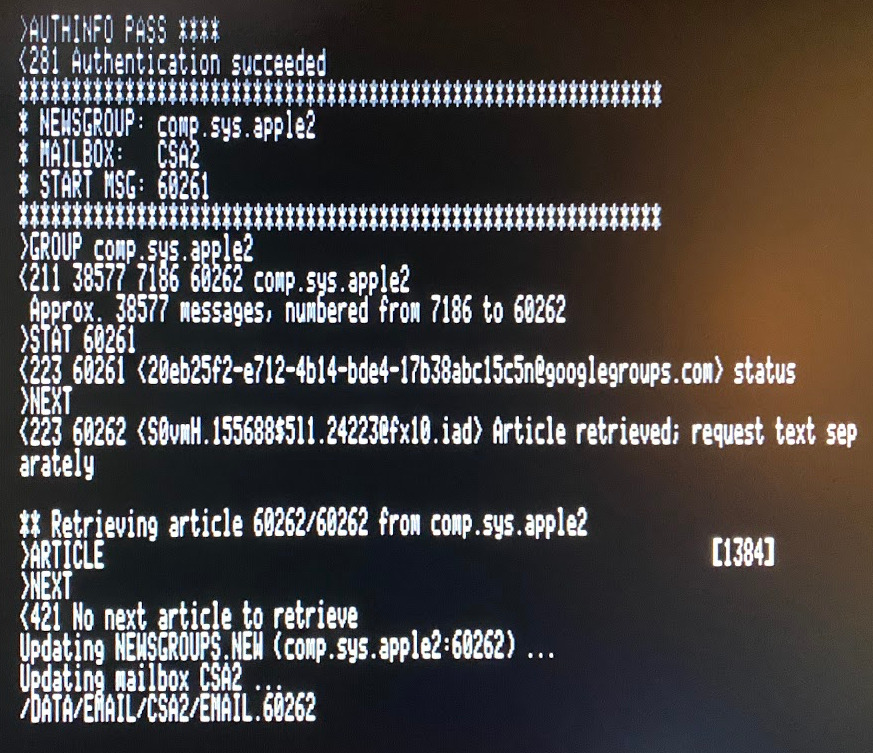4.6 KiB
Apple II Email and Usenet News Suite
NNTP65.SYSTEM
Run using Closed Apple-R in EMAIL.SYSTEM
NNTP65.SYSTEM is a Network News Transport Protocol (NNTP) client for the Apple II. It requires an Uthernet-II ethernet card and will not work with other interfaces without modification, because it uses the W5100 hardware TCP/IP stack.
NNTP65.SYSTEM handles downloading of news articles. Transmission is handled by NNTP65UP.SYSTEM.
Before running NNTP65.SYSTEM for the first time, be sure you have performed the basic Emai//er setup described here and have also performed the initialization specific to Usenet discussed in this page. In particular, the NEWS.SPOOL directory must have been created, otherwise NNTP65.SYSTEM will be unable to download news articles.
NNTP65.SYSTEM runs without any user interaction and performs the following tasks:
- Detect Uthernet-II.
- Obtain IP address using DHCP.
- If there is a file named
KILL.LIST.CFGthen load the file into memory. Each line is treated as a separate kill pattern. See the subsection Kill File below. - Connect to NNTP server using parameters from first three lines of
NEWS.CFG. (AUTHINFO USERandAUTHINFO PASScommands). - For each newsgroup listed in
NEWSGROUPS.CFG:- Issue
GROUPcommand to select the newsgroup. - Parse the respond from the server which indicates the message number of the first and last messages available in the newsgroup.
- If the article number in
NEWSGROUPS.CFGis zero, set the current article number to the last available article number minus 100 (so that up to 100 articles are retrieved when the newsgroup is retrieved for the first time.) Otherwise, set the current article number to the first article number recorded inNEWSGROUPS.CFG. - Issue the
STATcommand to the NNTP server for the current article number. - If the article does not exist, increment the current article number and loop to the previous step.
- For each article to be retrieved from the selected newsgroup:
- Issue the
NEXTcommand to the NNTP server to advance to the next article. - Issue to
ARTICLEcommand to retrieve the news article, writing it to a file in theNEWS.SPOOLdirectory (eg:/H1/DOCUMENTS/EMAIL/NEWS.SPOOL/NEWS.1234).
- Issue the
- Once all articles have been retrieved for this newsgroup, write an updated newsgroup line to the file
NEWSGROUPS.NEW. This will be identical to the line read fromNEWSGROUPS.CFGexcept with the last article number updated. - Examine each message in
NEWS.SPOOL. If there is a kill-file, the 'From:' header of the message is compared to each line in the killfile and if the text in the kill-file matches any part of the 'From:' header, the message is discarded. If there is no match, the message is copied from theNEWS.SPOOLdirectory to the mailbox for the newsgroup in question. If there is no kill-file then all messages are copied unconditionally.
- Issue
- Once all newsgroups have been retrieved, rename
NEWSGROUPS.NEWto replaceNEWSGROUPS.CFG. - Issue the
QUITcommand to disconnect from the NNTP server. - If
NNTP65.SYSTEMwas invoked fromEMAIL.SYSTEM, load and runEMAIL.SYSTEM. Otherwise quit t o ProDOS.
Kill File
It is possible to define a kill file which is used to filter incoming news articles according to the value of the 'From:' header. This facility is useful to filter out spam from a small number of nuisance senders.
- The kill file is a plain Apple II text file named
KILL.LIST.CFG. You can create and maintain such a file using Emai//er'sEDIT.SYSTEMor any other Apple II text editor. - Each line in the kill file is treated as a separate pattern.
- Pattern matching is very simple.
NNTP65.SYSTEMsimply checks each 'From:' header against each line in the kill file in turn. If any substring of the 'From:' header matches any line of the kill file, that message is discarded. - Only the first approximately 80 characters of each 'From:' header are examined.
- Subject to the limitation above, the matching can apply to any text in the 'From:' header, full names or email address.
- Don't make kill files too big. It will slow down news processing and (eventually) exhaust all the precious memory in your Apple II!

